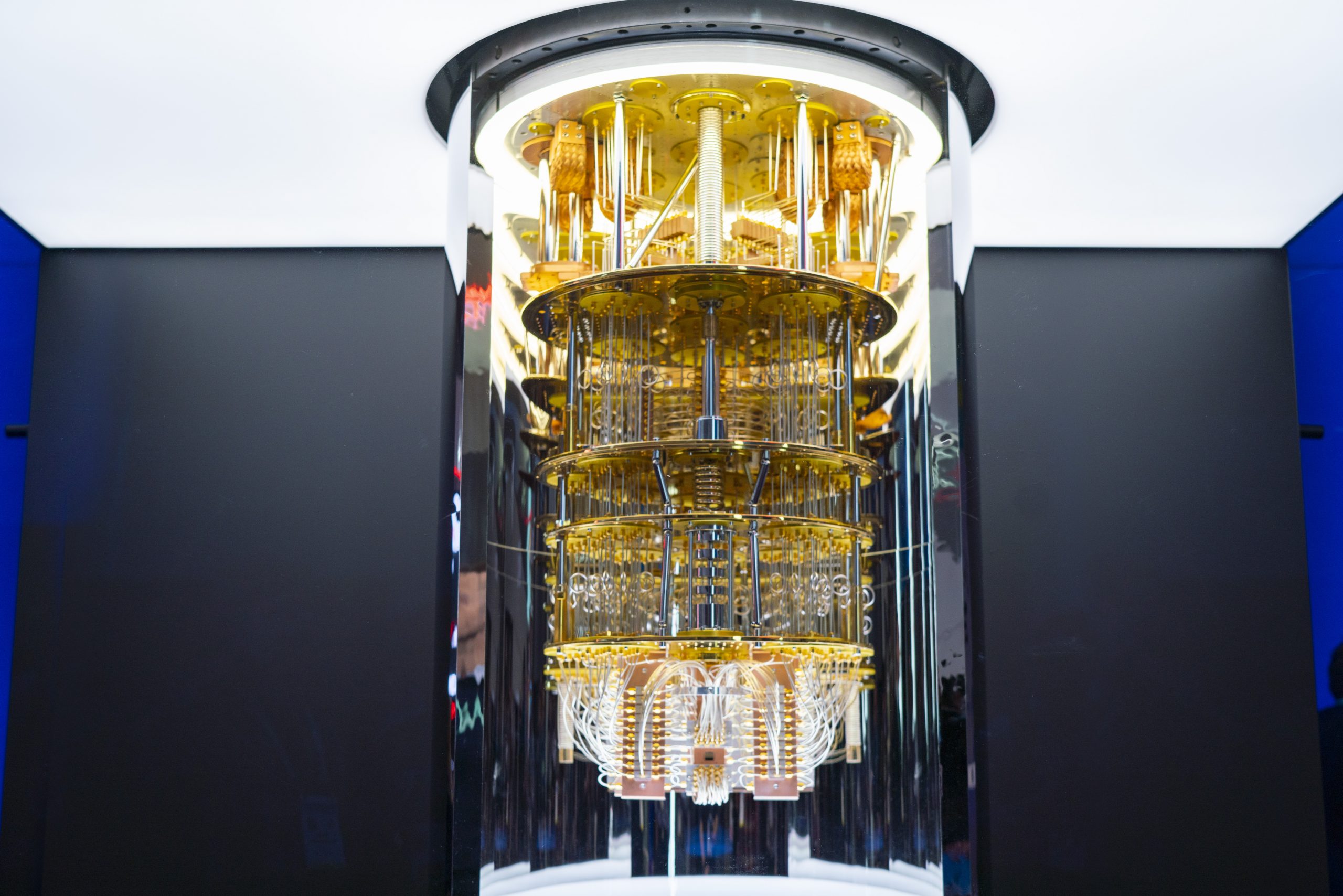
Image Courtesy : IBM
Stepping into the mesmerizing realm of quantum computing, where the 21st century’s technological tapestry is being woven with threads of promise and potential. Picture a symphony of innovation that could orchestrate a grand transformation across industries as diverse as healthcare, finance, and manufacturing. Now, cast your gaze upon India, a trailblazer in this cosmic dance of quantum possibilities, a player in the global sprint towards quantum supremacy.
In the year 2020, a monumental flare lit up the Indian scientific horizon—the birth of the National Mission on Quantum Technologies and Applications (NM-QTA). A five-year odyssey, generously endowed with a treasure chest of $1.2 billion, aimed at nurturing the growth of quantum wonders. Under this banner, research and development found its pulse racing in harmony with quantum vibrations.
Leading the caravan were eminent institutions—stellar constellations of knowledge—such as the Indian Institute of Science (IISc), the Indian Institute of Technology (IIT) Madras, and the Harish-Chandra Research Institute (HRI). Funds from the NM-QTA breathed life into countless projects, igniting intellectual supernovae across these citadels of enlightenment.
Yet, there’s more to this story of convergence. Behold the conjunction of the private and public sectors, where enterprise and innovation entwine like binary stars. As if guided by a force, private enterprises in India began casting their gaze upon the quantum tapestry. Witness the alchemical union of IIT Madras and the tech sorcerers at IBM, birthing a temple of quantum exploration—a sanctuary where qubits whisper secrets of the universe.
Venture deeper still, into the event horizon of 2022, when a proclamation resounded through the country: Sequoia Capital India, a titan among venture capitalists, would funnel a staggering $100 million into the primordial wellspring of quantum startups. The quantum connoisseurs and pioneers of tomorrow’s domain now had a patron, a benefactor propelling them towards the stars.
And as we peer through the hourglass into the horizon yet to be traversed, the winds whisper secrets of a radiant tomorrow. With the wheels of government commitment turning steadfastly, and the constellation of private enterprises growing with each passing moment, India emerges as a radiant quasar in the canvas of quantum computing. A protagonist in this narrative, India’s symphony with the stars resonates—her trajectory, a dazzling arch across the firmament of quantum destiny.
- Drug Discovery: Quantum computing’s ability to simulate complex molecular interactions can significantly accelerate drug discovery processes. Traditional methods involve time-consuming and costly trial-and-error approaches. Quantum computers can model molecular structures, interactions, and reactions more accurately, enabling scientists to identify potential drug candidates faster. This could lead to the development of novel medications for various diseases, potentially revolutionizing healthcare and reducing drug development timelines.
- Financial Modelling: Quantum computers’ computational power could be harnessed to optimize complex financial models and simulations. This could lead to more accurate predictions of market behaviour, risk assessment, and portfolio optimization. Investors and financial institutions could benefit from more informed decision-making, improved risk management, and potentially enhanced market stability.
- Material Design: Quantum computers can perform intricate simulations of atomic and molecular interactions, aiding in the design of innovative materials. By predicting and manipulating properties at the quantum level, researchers can develop materials with superior qualities, such as enhanced conductivity, strength, or energy storage capabilities. This could lead to breakthroughs in fields ranging from electronics to renewable energy.
- Climate Change Research: Quantum computers can simulate complex climate models and provide deeper insights into climate change dynamics. They can analyze vast amounts of data, helping scientists better understand climate patterns, predict extreme weather events, and assess the long-term impacts of various environmental factors. These insights could inform more effective climate policies and adaptation strategies.
- Artificial Intelligence: Quantum computing’s ability to handle complex optimization problems can advance machine learning and artificial intelligence (AI). Quantum algorithms can accelerate tasks like training deep neural networks, optimizing AI models and solving complex data analysis problems. This could lead to more efficient AI systems, enabling advancements in areas such as natural language processing, image recognition, and autonomous systems.
Overall, the adoption of quantum computing in India could revolutionize various industries, contributing to scientific advancements, economic growth, and societal progress. However, it’s important to note that quantum computing is still in its early stages, and practical implementations may take time to fully develop. Collaborative efforts between academia, industry, and government institutions will be crucial to realizing the potential of quantum computing in these and other domains.
These are just a few of the many potential applications of quantum computing in India. As technology continues to develop, it is likely that quantum computing will have a profound impact on many industries and sectors of the economy.
In the dance of intellect and innovation, the venerable International Business Machines (IBM) has intertwined its destiny with the illustrious Indian Institute of Technology, Madras (IIT-Madras), setting the stage for an enchanting symphony in the realm of quantum computing.
This partnership, akin to the joining of constellations, elevates IIT Madras to a pantheon of over 180 members within the global IBM Quantum Network. Like a luminous star ascending in the firmament, IIT Madras becomes the inaugural Indian institution to grace the global stage, where Fortune 500 behemoths, ambitious startups, erudite academic bastions, and visionary research enclaves converge, united by a singular purpose—to harness the ethereal power of IBM Quantum technology, unlocking the profound mysteries of quantum computing and unravelling the enigma of its business potential.
In a gathering of minds, Sandip Patel, the maestro orchestrating IBM India’s melody, resonated with excitement. In a symphony of words, he declared, “The collaboration will open new avenues to work with industry partners to accelerate research, make quantum real in areas such as life-saving drugs, improvements in supply chains, logistics and the modelling of financial data,”
A cornucopia of industries and disciplines shall reap the quantum harvest sowed through this collaborative ballet, transcending the confines of mundanity and embracing the realms of finance, energy manipulation, the alchemy of chemistry, the craft of material science, the artistry of optimization, the wizardry of machine learning, and even the tango of space exploration.
Through this union, the venerable IIT Madras gains ethereal access to the sacred sanctum of IBM’s advanced quantum sanctums, nestled within the boundless expanse of the cloud. In this sacred space, IIT Madras’ Centre for Quantum Information, Communication and Computing (CQuICC) shall wield IBM Quantum services as if conjuring spells, wielding the arcane Qiskit framework as their magical wand. The realms of quantum algorithms, the enigma of quantum machine learning, the artistry of quantum error correction, the incantations of quantum tomography, and the mystique of quantum chemistry shall be charted, paving the way for the growth of the quantum ecosystem within this nation.
Behold Qiskit Runtime, a spell crafted by IBM’s digital artisans, coursing through the veins of IBM Cloud. Like weavers, it harmoniously weaves classical threads of computation to construct intricate tapestries of quantum workloads. These cosmic designs are then channeled onto the grand tapestry of quantum systems, a symphony of execution on an unprecedented scale.
In the words of Prabha Mandayam, an alchemist of thought within IIT Madras’ hallowed halls, the inclusion in the IBM Quantum Network gifts the institute’s sages direct communion with quantum hardware of unparalleled sophistication. With the exhilarating resonance of harmonies, she exclaims,“It enables us to use our interdisciplinary expertise to tackle some of the challenging problems in the domain of quantum computing today. In short, it gives us a unique opportunity to play an active and direct role in this quantum revolution of our times,”
In the tale of kinship, IBM and IIT Madras have etched a saga of shared knowledge, birthing edifices of enlightenment in the realms of Artificial Intelligence and Machine Learning. Their conjuring even extended to the vast reaches of the digital cosmos, where a course on quantum computing was woven upon the loom, enlightening over 10,000 curious souls.
Amith Singhee, a sage at IBM Research India and a guardian of technological thresholds, sees India’s place within the quilt of quantum computing as pivotal. In a symphony of thoughts, he proclaims, “India is poised to play a pivotal role in the quantum technology revolution globally.”
“We are also developing the talent and skills landscape and building an ecosystem with industry, business, academia and government to help solve some of the most pressing challenges,”.
The annals of time have borne witness to IBM’s pioneering strides in quantum domains, and 2019 marked the dawn of their first commercial quantum system, adorned with a constellation of 20 qubits. In the tapestry of progress, the crescendo ascends, and November saw the unveiling of quantum processors adorned with 127 qubits—a celestial symphony of computational power. But the cadence marches forth, and by 2025, the prophecy foretells a quantum oracle—a computer adorned with a 4,000-qubit processor shall materialize, weaving quantum computing into the very fabric of the practical cosmos.
With IBM’s symphony harmonizing with IIT Madras’ intellectual feat, the future unfolds with the promise of a quantum dawn—an era where classical boundaries dissolve, unveiling a choreography of computing might and boundless potential, where the quantum realms intertwine with our own, unveiling the enigma of the universe itself.
As we stand on the precipice of a new technological era, quantum computing beckons us to explore the uncharted territory of quantum mechanics. The quotes of legendary physicists remind us of the profound mystery and power that quantum phenomena hold. With its potential to reshape industries and solve problems deemed impossible, quantum computing is poised to lead us into a future where the boundaries of computation are pushed to their limits and beyond.
Quantum computing, with its tantalizing blend of mind-bending quantum mechanics and groundbreaking potential, has captured the imagination of scientists, researchers, and innovators alike. As Nobel laureate Richard P. Feynman sagely remarked, “Nature uses only the longest threads to weave her patterns, so each small piece of her fabric reveals the organization of the entire tapestry.”
While still in its infancy, quantum computing stands poised to unravel the mysteries of the universe, shattering classical computational limitations and opening the door to a new era of technological marvels. As we continue our exploration of the quantum realm, we find ourselves on the cusp of a revolution that promises to reshape the very fabric of our understanding of computation and reality itself.






